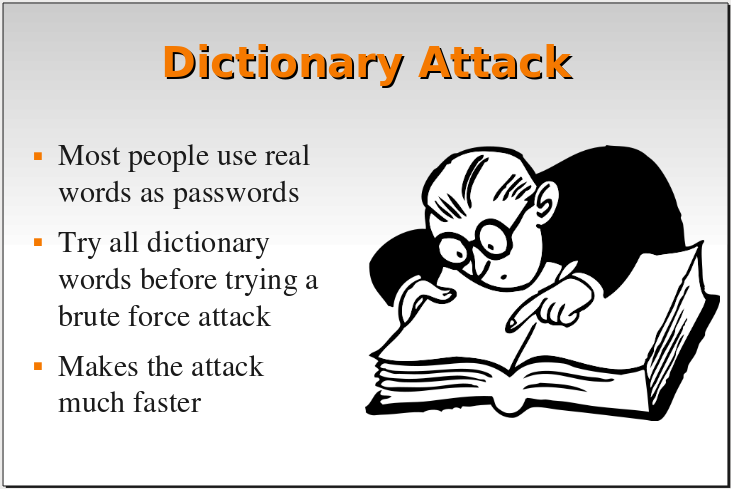Dictionary File For Password Cracking
-
- Password Cracking Dictionary Downloads
- Dictionary File For Password Cracking
- Dictionary Words Password List
Cracking A Password Protected Zip File Using Kali Linux Hacking Tools
We often use zipped files to store large files due to its small size and strong encryption algorithm. The zipping utility also comes with a facility of password protection which maintains the security of the files. However, sometimes it so happens that this feature turns into a nightmare if we forget the password.
Hacking a password protected zip file can be done with many password cracker utilities available online. However, if you are a Kali Linux user, password cracking becomes that much more easy with an open source tool called fcrackzip.
Fcrackzip is a fast password cracker partly written in assembler and available for Kali Linux. It is able to crack password protected zip files with brute force or dictionary based attacks allowing you to unzip files even with most hard passwords.
Passwords are typically cracked using one or more of the following methods. The most simple password crackers using dictionary attacks use a list of common.

Go to Application ? Kali Linux ? Password Attacks ? Offline Attacks ? fcrackzip
Open Terminal type fcrackzip –help. This command will open fcrackzip with help options
Syntax – fcrackzip –u –c <your password character type> –p <total digits> zip file path
Ex – fcrackzip –u –c 1 –p aaaaaaaa ‘/root/Desktop/Test.zip’
Here,
The –u option, Try to decompress the first file by calling unzip with the guessed password. This weeds out false positives when not enough files have been given.
The –c option lets you select the character set, ‘1’ here means password also be numeric.
The -p option lets you select an initial string to start brute-force attack.
Note – as you can see the ‘aaaaaaaa’, if you will count this is total 8 digits for your password to be in 8 digits
Syntax – fcrackzip –u –c <your password character type> -l <password digits range> zip file path
Ex – fcrackzip –u –c 1 –l 4-8 ‘/root/Desktop/Test.zip’
In this example, the Zip file has small (lower case) alphabet digits as a password. Here password is ‘abcdefgh’. If your password has small alphabets characters and length of the password is 8 digits.
Password Cracking Dictionary Downloads
Syntax – fcrackzip –u –c <your password character type> –p <total digits> zip file path
Ex – fcrackzip –u –c a –p aaaaaaaa ‘/root/Desktop/Test1.zip’
Here we are using ‘a’ after –c because our password has small (lower case) alphabet. If you have doubt that the password has a upper case alphabet than replace ‘a’ with capital ‘A’. If you think that your password has both upper and lower case than you can write ‘Aa’. Just like this if you doubt your password has lower case (a), Upper case (A), numeric (1). You have to write there ‘Aa1’.
Syntax – fcrackzip –u –D –p <dictionary file path> <zip file path>
Ex – fcrackzip –u –D –p ‘/root/Desktop/dic’ ‘/root/Desktop/Test.zip
So finally we have an all-encompassing command for cracking the password protected file which should look like this >
fcrackzip -b -c ‘aA1!’ -l 1-10 -u file_name.zip
In cryptanalysis and computer security, a dictionary attack is a form of brute force attack technique for defeating a cipher or authentication mechanism by trying to determine its decryption key or passphrase by trying hundreds or sometimes millions of likely possibilities, such as words in a dictionary.
Technique[edit]
A dictionary attack is based on trying all the strings in a pre-arranged listing, typically derived from a list of words such as in a dictionary (hence the phrase dictionary attack).[1]In contrast to a brute force attack, where a large proportion of the key space is searched systematically, a dictionary attack tries only those possibilities which are deemed most likely to succeed. Dictionary attacks often succeed because many people have a tendency to choose short passwords that are ordinary words or common passwords, or simple variants obtained, for example, by appending a digit or punctuation character. Dictionary attacks are relatively easy to defeat, e.g. by using a passphrase or otherwise choosing a password that is not a simple variant of a word found in any dictionary or listing of commonly used passwords.
What's more, once on the pitch, all decisions are left to the player. Platerse are free to dribble and pass in any direction they desire. Pes 11 download full version.
Pre-computed dictionary attack/Rainbow table attack[edit]
It is possible to achieve a time–space tradeoff by pre-computing a list of hashes of dictionary words, and storing these in a database using the hash as the key. This requires a considerable amount of preparation time, but allows the actual attack to be executed faster. The storage requirements for the pre-computed tables were once a major cost, but are less of an issue today because of the low cost of disk storage. Pre-computed dictionary attacks are particularly effective when a large number of passwords are to be cracked. The pre-computed dictionary need be generated only once, and when it is completed, password hashes can be looked up almost instantly at any time to find the corresponding password. A more refined approach involves the use of rainbow tables, which reduce storage requirements at the cost of slightly longer lookup-times. SeeLM hash for an example of an authentication system compromised by such an attack.
Pre-computed dictionary attacks, or 'rainbow table attacks', can be thwarted by the use of salt, a technique that forces the hash dictionary to be recomputed for each password sought, making precomputation infeasible, provided the number of possible salt values is large enough.
Dictionary File For Password Cracking
Dictionary attack software[edit]
See also[edit]
References[edit]
External links[edit]
Dictionary Words Password List
- RFC 2828 – Internet Security Glossary
- RFC 4949 – Internet Security Glossary, Version 2